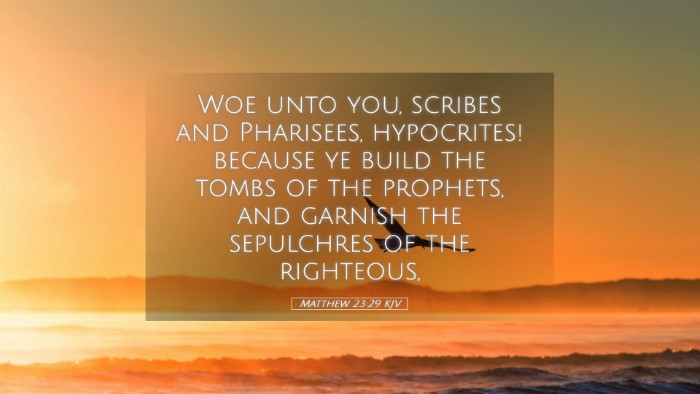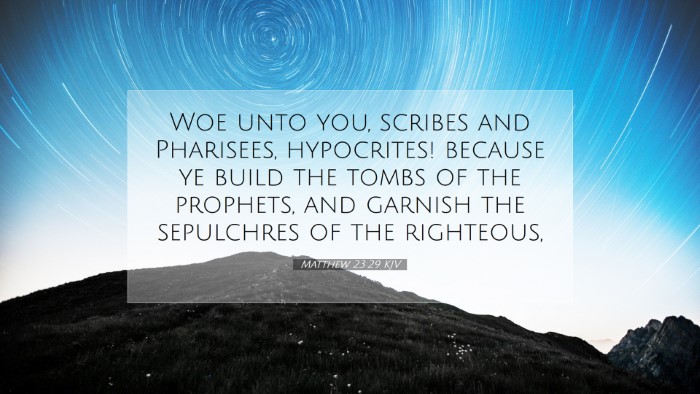Commentary on Matthew 23:29
Matthew 23:29 reads: "Woe unto you, scribes and Pharisees, hypocrites! because ye build the tombs of the prophets, and garnish the sepulchers of the righteous." This verse sits within a larger passage where Jesus pronounces woes upon the religious leaders of His day. The context reveals significant patterns of hypocrisy and a failure to recognize the true essence of prophetic witness.
Historical Context
The scribes and Pharisees were respected figures in Jewish society, often regarded as the custodians of the Law. However, their outward piety and devotion were frequently superficial. In building tombs for the prophets, they displayed an external respect while internally harboring the spirit of rejection toward the very truths those prophets proclaimed.
Matthew Henry's Insight
Matthew Henry notes that this passage addresses the duplicity of the hypocrites. They claim admiration for the prophets, yet they share in the guilt of their rejection. Henry emphasizes that their actions are not mere remembrances but a deeper hypocrisy when they allow their predecessors' teachings to be disregarded. He elaborates:
- The irony of their actions: While they physically honor the prophets by decorating their graves, they spiritually distance themselves from the message those prophets delivered.
- Self-deception: This scenario illustrates how the religious leaders fail to see their own moral condition, blind to their contradiction between word and deed.
Albert Barnes's Reflections
Albert Barnes offers a rich perspective on the significance of the tombs. He points out that the act of garnishing sepulchers implies a public display of affection for the prophets while simultaneously ignoring their warnings. Barnes highlights several key elements:
- Moral Obligation: The leaders, by honoring the tombs, suggest that they would not have rejected the prophets; yet their actions betray their arrogance and spiritual blindness.
- Warnings Ignored: The prophets they honored spoke against the sins contemporary to the scribes and Pharisees, indicating a refusal to accept the divine counsel meant for their correction.
Adam Clarke's Commentary
Adam Clarke provides a detailed examination of the term "hypocrites" in this verse. He indicates that the contrast between their words and actions is not merely a doctrinal issue but ultimately a heart issue. Some of Clarke's notable points include:
- External Religion vs. Internal Righteousness: Building tombs outwardly expresses esteem for the prophets while inwardly, they are complicit in continuing their rejection.
- Historical Parallels: Clarke draws attention to the broader history of Israel, revealing that the same leaders who honored the dead often persecuted the living prophets, showcasing an enduring cycle of rebellion against God's chosen messengers.
Theological Implications
This verse provokes deep theological reflection, especially concerning the nature of true honor and respect in the context of faith. The scribes and Pharisees embody a spectrum of behavior that is all too familiar in various religious traditions:
- Honor vs. Obligation: It raises questions about how we honor those who speak truth in our lives. Are our memorials and remembrances sincere if our lives reflect no adoption of their teachings?
- Spiritual Blindness: This hypocrisy can serve as a warning to contemporary believers—reminding us that one can profess faith while holding onto behaviors that contradict the very doctrines we espouse.
- A Call to Authenticity: The call to avoid hypocrisy is echoed throughout Scripture, urging believers to align their actions with their professed beliefs.
Application for Today
For pastors, students, theologians, and scholars, this passage invites several applications:
- Examine Personal Hypocrisy: Each individual is encouraged to interrogate personal beliefs versus practices and to identify areas of dissonance.
- Cultivating a Heart of Repentance: Emphasis on repentance is crucial; acknowledging areas where one may be honoring the past while neglecting personal spiritual growth is essential for a vibrant faith.
- Encouraging Integrity in Ministry: Leaders are reminded to lead by example, ensuring that their professions of faith are reflected in genuine, transformative actions.
Conclusion
In summary, Matthew 23:29 challenges its readers to confront the innate hypocrisy that can lurk within religious observance. As noted by revered commentators such as Henry, Barnes, and Clarke, the external practices of honoring the prophets must be matched by an internal commitment to their teachings. As followers of Christ, may we strive for authenticity and seek to fully embrace the prophetic voices within our own traditions, aligning our lives with the truth they proclaim.


